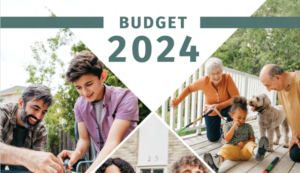 Prime Minister Justin Trudeau’s 8th federal budget features $52.9 billion in new spending over five years, according to the CBC.
Prime Minister Justin Trudeau’s 8th federal budget features $52.9 billion in new spending over five years, according to the CBC.
You can find the 430-page budget — titled Fairness for Every Generation — at the Department of Finance website here.
Released at 4 pm Tuesday, the wealthiest 0.13% of Canadians will be hit with a higher capital gains inclusion rate: as of June 25, the inclusion rate will rise to 66% for capital gains in excess of $250,000 a year, and this will also apply to corporations.
You can find details at the Globe & Mail’s coverage here. (may only be viewable by subscribers.) For those who can’t access, it says:
“The budget doesn’t make any changes to income tax rates, nor does it include an explicit wealth tax. Instead, the tax hikes are focused on capital gains … as of June 25, the inclusion rate on capital gains realized annually above $250,000 by individuals – and on all capital gains realized by corporations and trusts – will rise from one-half to two-thirds.”
The lifetime capital-gains exemption for Canadians will rise from $1-million to $1.25-million, the Globe says, and “The total capital-gains exemption from the sale of a principal residence will not change.” Speaking on CBC, G&M columnist Andrew Coyne called it an “underwhelming” document.
Coyne’s G&M column on the budget bore the scathing headline A government with no priorities, no anchors, and when it comes to growth, no clue. Subscribers can read it here.
A typical passage from his piece:
“…. there is not a single measure in the budget aimed at boosting investment generally – as opposed to the usual slew of measures aimed at diverting investment
into the government’s favoured sectors: artificial intelligence, ‘clean’ technologies, and so on.”
Jamie Golombek’s take on Taxes
Here is what CIBC Wealth’s tax guru, Jamie Golombek, had to say in the Financial Post.
The federal budget released on Tuesday did not contain a general tax rate increase for the wealthy, but the government did announce that the capital gains inclusion rate will be going up and it amended the draft alternative minimum tax rules in response to concerns of the charitable sector .
On the rise in the capital gains inclusion rate, Golombek says “the $250,000 threshold will apply to capital gains realized by an individual, net of any capital losses either in the current year or carried forward from prior years .. Capital losses carried forward from prior years will continue to be deductible against taxable capital gains in the current year by adjusting their value to reflect the inclusion rate of the capital gains being offset. This effectively means that a capital loss realized at the current 50 per cent allowable rate will be fully available to offset an equivalent capital gain realized after the rate change.”
MoneySense’s Jason Heath
Fee-only financial planner Jason Heath penned this insightful analysis for MoneySense. He covers everything from the higher capital gains inclusion rate to impact on entrepreneurs, housing, renters and much more.
Rob Carrick’s Personal Finance report card
G&M personal finance columnist Rob Carrick created a personal finance Budget report card here. He gave Taxes a C-minus grade, Housing a B, Junk Fees a C and Open Banking a D, and Saving for postsecondary education an A.
On the other side, the Finance department says an Improving economy means higher tax revenue: $20 billion in new revenue in five years. The $40 billion deficit is projected to stay more or less pat till 2025/2026, after which it starts to inch down.
$46 billion next year on payments on the Debt
Here’s initial coverage of the budget from National Post. There, it reports that Ottawa will spend $480 billion next year, including $46 billion in payments on the national debt. Among the highlights mentioned:
“Among the new spending is more money for home building, including tax measures that allow first time buyers to take more money out of their RRSP for a down payment and to delay when they start repaying the money.There is also $1.1 billion for interest-free student loans and grants, more funding for the Liberal daycare program and for the first phases of national pharmacare that will cover insulin and contraceptives. There is also funding for a new disability benefit and money for artificial intelligence research.”
Mix of Bad Economics and Bad Politics
Also in the National Post, Philip Cross dubbed the budget “a continuation of the Trudeau government’s orgy of spending financed by debt and higher taxes.”
Sample passage:
“Besides being bad economics, the government’s massive spending is bad politics because it antagonizes most provinces without any obvious electoral return from its spending.”
Public service to shrink by 5,000 over 4 years
The CBC reported here that the public service will contract by 5,000 full-time equivalent positions over the next four years from the current figure of about 368,000.
Housing initiatives, sin taxes & combatting rampant auto theft
Like much of the rest of the budget, many measures were telegraphed or outright announced weeks in advance. This Canadian Press feed ran in the Financial Post. Among measures cited to fulfill the goal of building almost 3.9 million homes by 2031, it said Ottawa plans to:
- increase the capital cost allowance rate for apartments from four to 10 per cent, allowing builders larger tax writeoffs;
- extend the mortgage amortization period to 30 years for first-time homebuyers purchasing new builds;
- make more public lands available for home construction, including Canada Post and National Defence properties, and lease land to developers;
- spend $250 million over two years to address the “urgent issue” of encampments and a shortage of shelter space for homeless people.


